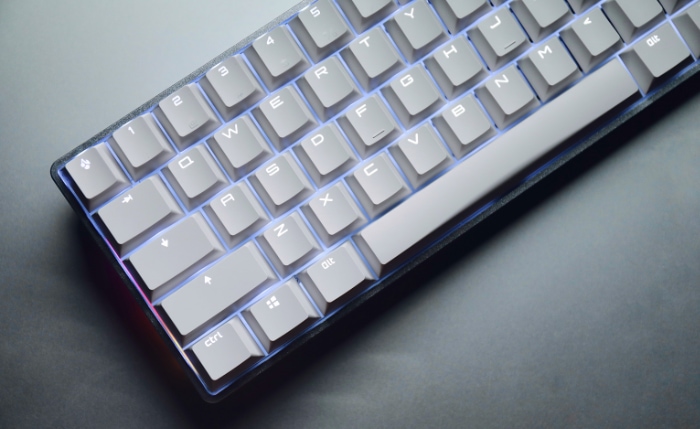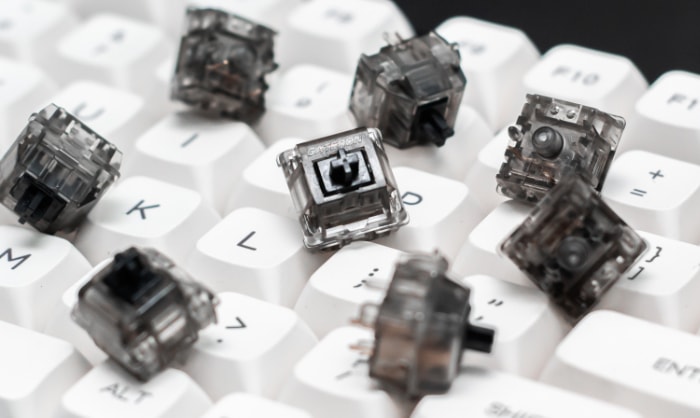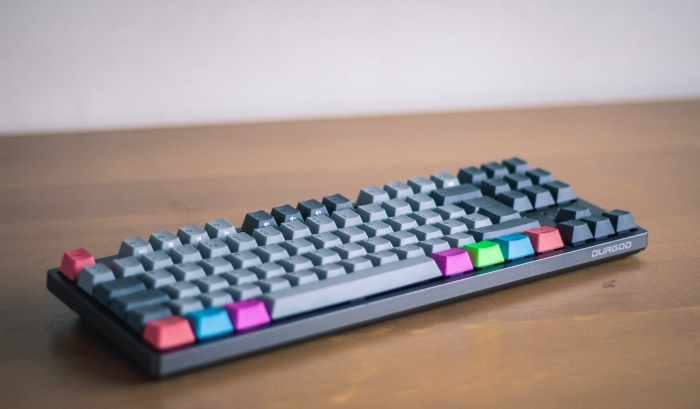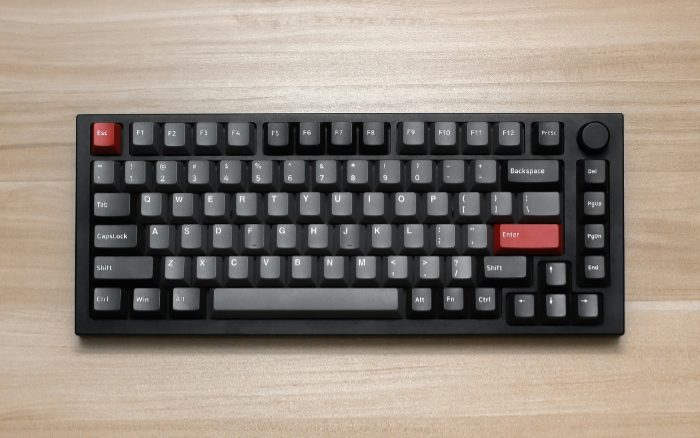The Advantages of a Mechanical Keyboard: Feel the Difference

Step into the dynamic and tactile universe of mechanical keyboards, where every click and clack isn’t just inputting data, but an entirely unique interaction with your computer. Imagine a tool that transforms mundane typing into an engaging and satisfying experience.
This isn’t the realm of the future; it’s the reality offered by mechanical keyboards, a technology that redefines our interaction with the digital world. From the satisfying sound of a keystroke to the durability that outlasts its counterparts, mechanical keyboards are not just devices, but partners in your digital journey.
Tactile Feedback and Typing Experience
Mechanical keyboards provide a distinct typing experience, primarily due to their tactile feedback. Unlike traditional keyboards, where keys often feel soft and mushy, mechanical keyboards offer a precise and crisp response.
The Mechanics of Tactile Feedback
Mechanical keyboards use individual mechanical switches under each key. These switches are designed to provide physical feedback every time a key is pressed.
This feedback can be a ‘clicky’ sound, a tactile bump, or a smooth linear action, depending on the type of switch used. This mechanical action ensures that you feel and hear each keystroke, confirming the input without having to press the key all the way down.
Impact on Typing Speed and Accuracy
The tactile response of mechanical keyboards can lead to faster and more accurate typing. With each key requiring a certain amount of force to actuate, typists can develop a rhythm and speed that might be hard to achieve on a membrane keyboard.
This physical feedback helps in minimizing errors, as typists can feel whether a key has been fully pressed or not.
A Diverse Range of Typing Experiences
Mechanical keyboards come in a variety of switch types, each offering a different typing experience. Common types include tactile, linear, and clicky switches.
Tactile switches provide a noticeable bump when activated, ideal for typists who prefer feedback without loud clicks. Linear switches offer a smooth keystroke, preferred for their quietness and consistency.
Clicky switches, known for their audible click and tactile bump, provide a classic mechanical keyboard experience.
Personal Preference and Comfort
The choice of switch type in a mechanical keyboard often comes down to personal preference and comfort. Some users prefer the audible feedback of clicky switches, while others may opt for the quietness of linear switches.
The ability to choose a switch type that suits one’s typing style and comfort can lead to a more enjoyable and efficient typing experience.
Reduced Typing Fatigue
Due to their design, mechanical keyboards can also reduce typing fatigue. The tactile feedback allows for less forceful typing, as the actuation point is usually halfway through the keypress.
This means that typists do not need to bottom out the keys with each stroke, reducing the strain on fingers during prolonged typing sessions.
Durability and Longevity
One of the most significant advantages of mechanical keyboards is their durability and longevity. Built to withstand millions of keystrokes, these keyboards are a long-term investment for both typing enthusiasts and professionals.
Superior Build Quality
Mechanical keyboards are known for their superior build quality. They are often made with high-quality materials such as metal or sturdy plastics, which contribute to their robustness.
The individual mechanical switches under each key are designed to endure a high number of keystrokes, far surpassing the lifespan of typical membrane keyboard keys.
Lifespan of Mechanical Switches
The switches in mechanical keyboards are rated for a high number of keystrokes, often ranging from 20 to 70 million keypresses, depending on the switch type. This is significantly higher than the average membrane keyboard, which typically lasts for about 5 to 10 million keystrokes.
This extended lifespan means that mechanical keyboards can remain functional and reliable for years, even under heavy usage.
Cost-Effectiveness Over Time
While mechanical keyboards may have a higher upfront cost compared to membrane keyboards, their extended lifespan makes them more cost-effective in the long run. The durability of mechanical keyboards means less frequent replacements, saving money and reducing waste over time.
This is especially important for users who rely heavily on their keyboards for work or gaming.
Ease of Maintenance and Repair
Another aspect of mechanical keyboards that contributes to their longevity is the ease of maintenance and repair. Individual keys can be easily removed for cleaning or replacement, which is not always possible with membrane keyboards.
This modularity not only makes cleaning easier, thereby extending the keyboard’s life, but also allows for easy repairs if a particular switch or keycap gets damaged.
Environmental Impact
From an environmental perspective, the longevity and repairability of mechanical keyboards mean less electronic waste. As these keyboards don’t need to be replaced as often as membrane keyboards, they contribute to a reduction in e-waste, aligning with more sustainable computing practices.
This makes them a more environmentally friendly choice for conscious consumers.
Customization and Variety

Mechanical keyboards offer a level of customization and variety that is unmatched by traditional keyboards. This ability to personalize not only enhances the user experience but also allows individuals to express their unique style and preferences.
Wide Range of Switch Types
The heart of a mechanical keyboard’s customization lies in its switches. There are several types of mechanical switches, each with its own feel and sound.
The most common categories include tactile, linear, and clicky switches. Tactile switches offer a noticeable bump feel without a loud click, linear switches are smooth and quieter, and clicky switches provide both a tactile bump and an audible click.
This variety allows users to choose a switch that best suits their typing habits and preferences.
Keycap Customization
Keycaps are another area where mechanical keyboards shine in terms of customization. Users can choose from a wide array of keycap materials, designs, and colors.
Keycaps made of ABS (Acrylonitrile Butadiene Styrene) or PBT (Polybutylene Terephthalate) are popular, with PBT being more durable and resistant to wear. Custom keycaps can feature anything from simple color schemes to elaborate artistic designs, allowing users to personalize the look of their keyboard to their taste.
LED Backlighting and Aesthetics
Many mechanical keyboards come with LED backlighting, adding not just functionality but also an aesthetic appeal. Users can often customize the color and pattern of the lights, creating a visually striking setup that reflects their style.
This feature is especially popular among gamers and those who appreciate a vibrant workspace.
Ergonomic Customization
Customization also extends to ergonomics. Mechanical keyboards are available in different sizes and layouts, like full-size, tenkeyless, or compact designs.
Some models offer split designs or adjustable components for a more ergonomic setup, reducing strain during long typing sessions. This flexibility allows users to choose a keyboard that fits their space requirements and comfort needs.
Personal Preference and Performance
Ultimately, the customization of a mechanical keyboard is about aligning with personal preferences for both aesthetics and performance. Whether it’s a writer seeking a comfortable typing experience, a gamer needing precise and rapid key actuation, or anyone in between, the variety in mechanical keyboards caters to a wide spectrum of needs and tastes.
This level of customization not only enhances the user experience but also turns the keyboard into a personal statement piece in any setup.
Ergonomic Benefits
Mechanical keyboards are not just about the tactile feel and durability; they also offer significant ergonomic benefits. Ergonomics is all about designing products to fit the user’s needs, ensuring comfort and minimizing the risk of strain or injury.
For those spending long hours typing, the ergonomic advantages of mechanical keyboards are a game-changer.
Improved Typing Posture
Mechanical keyboards can encourage a better typing posture. Their design often includes adjustable stands or feet, allowing users to set the keyboard at an angle that reduces wrist strain.
Some models offer a split design, enabling the hands to stay in a more natural position, further reducing the risk of discomfort or repetitive strain injuries.
Key Placement and Reduced Strain
The layout of mechanical keyboards is typically well thought out with ergonomics in mind. The keys are positioned and spaced in a way that promotes a natural hand and finger placement.
This setup helps in reducing unnecessary finger movement and strain. The keys on a mechanical keyboard often require less force to press, which means less effort for each keystroke, further reducing the strain on fingers and hands.
Customizable Keyboards for Individual Needs
One of the standout features of mechanical keyboards in terms of ergonomics is their customizability. Users can choose from different sizes and layouts, such as tenkeyless models which eliminate the number pad to allow for a more centered and comfortable typing position.
This customization ensures that users can find a keyboard that fits their specific ergonomic needs, whether it’s a compact design to save desk space or a split layout to maintain a healthier wrist position.
Tactile Feedback and Reduced Typing Errors
The tactile feedback of mechanical keyboards also contributes to ergonomics. The clear tactile bump and audible click can reduce the need to look down at the keyboard, allowing for a more relaxed neck and shoulder position.
Additionally, this feedback can help in reducing typing errors, as users receive immediate physical confirmation of keypresses, leading to more confident and efficient typing.
Long-Term Health Benefits
Over time, using a mechanical keyboard can offer long-term health benefits. By promoting a better posture, reducing strain, and providing a comfortable and customizable typing experience, these keyboards can help in preventing issues like carpal tunnel syndrome, tendonitis, and other repetitive strain injuries associated with prolonged keyboard use.
For anyone spending significant time typing, the ergonomic benefits of a mechanical keyboard are a valuable investment in health and comfort.
Gaming Performance

Mechanical keyboards have become a staple in the gaming community, and for good reason. Their design and features offer a distinct advantage in gaming performance.
Enhanced Responsiveness and Speed
One of the key benefits for gamers using mechanical keyboards is their enhanced responsiveness. The individual switches in these keyboards are designed for quick actuation, meaning they register a keypress faster than traditional membrane keyboards.
This quick response time is crucial in gaming, where every millisecond can be the difference between victory and defeat.
Reliability During Intense Gaming Sessions
Mechanical keyboards are built to withstand the rigors of intense gaming sessions. Their durable construction ensures that they can handle rapid and repeated key presses without failing.
This reliability is essential for gamers who need their equipment to perform consistently, especially during competitive play or long gaming marathons.
Advanced Features: Key Rollover and Anti-Ghosting
Many mechanical keyboards come equipped with advanced features like key rollover and anti-ghosting. Key rollover refers to the ability of the keyboard to register multiple keypresses at once, an essential feature for complex gaming commands.
Anti-ghosting ensures that every keypress is accurately registered, even when multiple keys are pressed simultaneously. These features ensure that gamers’ inputs are precisely captured, preventing missed commands and ensuring smooth gameplay.
Customization for Gaming Optimization
Customization is another area where mechanical keyboards shine in gaming. Gamers can choose keyboards with customizable backlighting, programmable keys, and macro functions, allowing them to tailor their setup to their gaming needs.
This level of customization not only enhances the gaming experience aesthetically but also allows gamers to set up their keyboards for optimal performance in their favorite games.
Testimonials from the Gaming Community
The popularity of mechanical keyboards in the gaming community is supported by numerous testimonials from gamers who have experienced a noticeable improvement in their gameplay. Many report that the switch to a mechanical keyboard has enhanced their gaming experience, offering them better control, faster response times, and a more enjoyable gaming session overall.
The consistent preference for mechanical keyboards among gamers is a testament to their superior performance and impact on gaming.
Sound Profile

The sound profile of a mechanical keyboard is a unique aspect that distinguishes it from other types of keyboards. Each keystroke produces a distinct sound, which varies depending on the type of switch used.
The Distinct Sound of Mechanical Keyboards
Mechanical keyboards are known for their characteristic sound, which can range from a subtle click to a pronounced clack, depending on the switch type. Clicky switches, for example, produce a loud and satisfying click with each press, while linear switches offer a quieter, more muted sound.
This auditory feedback can be pleasing to many users, providing a sense of rhythm and engagement during typing or gaming.
User Experience and Sound Preferences
The sound of a mechanical keyboard can significantly impact the user experience. For some, the clicking sound is a crucial part of the typing experience, offering a rhythmic feedback that can enhance focus and productivity.
For others, particularly in shared workspaces, a quieter keyboard may be preferable. The sound profile of a keyboard is often a matter of personal preference, influenced by the user’s environment and their sensitivity to noise.
Considerations for Different Environments
When choosing a mechanical keyboard, it’s important to consider the environment in which it will be used. In an office setting, a keyboard with a quieter sound profile might be more appropriate to avoid disturbing colleagues.
In contrast, at home or in a private workspace, the sound may be a less critical factor, and users might enjoy the distinctive click of a mechanical keyboard.
Sound Customization Options
Mechanical keyboards offer the ability to customize the sound through different means. Switches can be swapped out for those with a different sound profile, and some users opt for o-rings or dampeners to reduce the noise level.
This level of customization allows users to fine-tune their keyboard’s sound to their liking, ensuring that it suits their preferences and environment.
The Role of Sound in Typing Satisfaction
The sound of a mechanical keyboard can play a significant role in typing satisfaction. Many users find that the audible feedback from each keystroke adds to the overall enjoyment and satisfaction of typing.
This sensory experience is one of the reasons why mechanical keyboards have a dedicated following, with enthusiasts often seeking the perfect sound profile that complements their typing style and preferences.
Conclusion
Mechanical keyboards stand out as more than just typing devices; they are a blend of functionality, durability, and personal expression. From the tactile feedback and ergonomic benefits that enhance typing efficiency and comfort, to the robustness that ensures longevity, these keyboards are designed to cater to a wide array of needs.
The customizable nature, both in aesthetics and functionality, makes them appealing to a diverse user base, from professionals to gamers. The unique sound profiles further add to their charm, allowing users to choose a keyboard that not only feels right but also sounds right, according to their personal preferences and environment.
Mechanical keyboards represent a significant step forward in the world of typing and computing, providing an experience that goes beyond mere functionality, embracing personalization, comfort, and style. For anyone considering a new keyboard, the compelling features of mechanical keyboards make them a choice worth considering.



